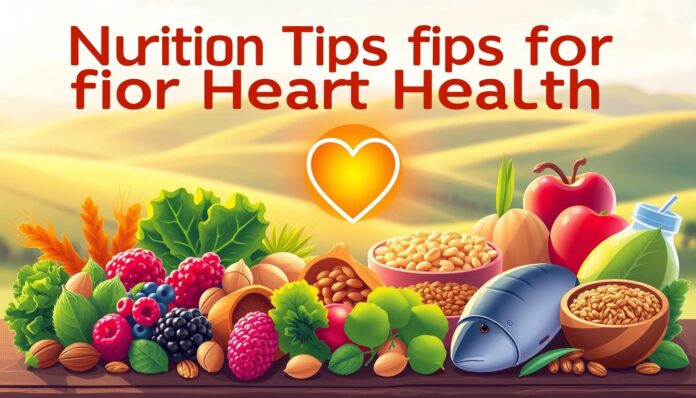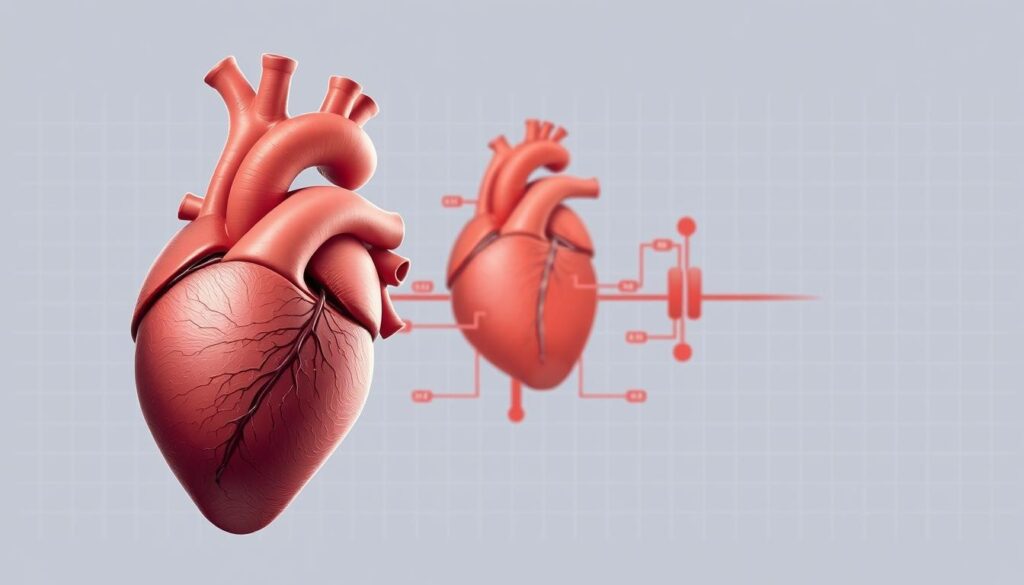Ever thought about how changing your diet can boost your heart health? In today’s world, it’s easy to get lost in conflicting health advice. But, knowing the basics of a heart-healthy diet is key. This article will guide you through important nutrition tips for heart health.
You’ll learn about the essential dietary patterns and lifestyle changes that can greatly improve your heart health. Discover how making smart food choices and eating mindfully can help prevent and manage heart diseases.
Key Takeaways
- Simple dietary changes can have a profound impact on heart health.
- A heart-healthy diet emphasizes fruits, vegetables, whole grains, and lean proteins.
- Portion control plays a vital role in maintaining cardiovascular wellness.
- Understanding and limiting unhealthy fats can protect your heart.
- Reducing sodium intake is essential for managing blood pressure.
- Incorporating regular physical activity complements your heart-healthy diet.
- Practical meal planning and recipes can make healthy eating enjoyable.
Understanding Heart Health
Knowing about heart health is key for a better life and longer years. A healthy heart pumps blood well, has a good heart rate, and works efficiently. The American Heart Association stresses the need to know what affects heart health.
Heart disease is a big killer in the U.S. Knowing how to prevent it starts with spotting risks like bad food, not moving enough, and smoking. You can make your heart healthier by living well and eating right.
Working out regularly, like cardio, helps your heart rate and burns calories. This is great for your heart. Eating well and staying hydrated also helps keep your heart in top shape.
Trying out different workouts, like HIIT, can boost your heart health. A mix of exercise and good food is key to a healthy heart. For more tips on workouts, check out this resource to help you on your heart health journey.
Benefits of a Heart-Healthy Diet
Choosing a heart-healthy diet brings many benefits to your overall health. It helps lower the risk of heart disease, manage blood pressure, and improve cholesterol levels. These improvements come from eating foods rich in nutrients good for your heart.
Eating a variety of fruits, vegetables, whole grains, lean proteins, and healthy fats is key. These foods are full of vitamins, minerals, and antioxidants. They fight inflammation and keep your heart working well.
Also, a heart-healthy diet can boost your energy and help with weight management. You might feel more mentally clear and overall happy. Starting a heart-healthy diet is a great way to improve your life.
Nutrition Tips for Heart Health
Making smart food choices is key to keeping your heart healthy. Eating a mix of fruits, vegetables, whole grains, and healthy proteins can boost your health. Here are some easy tips to add to your meals for better heart health.
The Power of Fruits and Vegetables
Fruits and vegetables are packed with vitamins, minerals, and fiber but are low in calories. Eating a variety of these foods helps your heart and keeps your diet balanced. Try to have at least five servings a day. Leafy greens, berries, and cruciferous veggies are great for your heart.
Whole Grains and Their Importance
Whole grains are full of nutrients that are good for your heart. Gluten-free options like quinoa, brown rice, and oats help lower cholesterol and improve heart function. Switching to whole grains can greatly improve your health. Choose whole-grain bread, pasta, and cereals for more fiber.
Healthy Protein Sources
Proteins help your body repair and grow. Choose heart-friendly proteins like beans, lentils, fish, and lean meats. Plant-based proteins are great for lowering cholesterol. Adding low-fat dairy products can also add variety to your protein choices. Aim for a variety of proteins that are good for your heart.
| Food Group | Recommended Options | Heart Health Benefits |
|---|---|---|
| Fruits | Berries, apples, oranges | High in antioxidants, fiber |
| Vegetables | Spinach, broccoli, carrots | Rich in vitamins, minerals |
| Whole Grains | Quinoa, brown rice, oatmeal | Lower cholesterol, high in fiber |
| Protein Sources | Lentils, chicken, salmon | Supports muscle health, lowers heart disease risk |
Portion Control for Better Heart Health
Portion control is key for heart health. It helps you avoid overeating and keep a healthy weight. Overeating can raise blood pressure and cholesterol, harming your heart.
Strategies for managing portions can boost your nutrition. Using smaller plates makes food seem more. Fill half your plate with fruits and veggies to stay full without too many calories. It’s important to watch the calories in high-calorie foods.
To get portion sizes right, follow these steps:
- Measure servings with standard tools or your hand.
- Read food labels to know serving sizes and portions.
- Plan meals to avoid making impulsive portion choices.
These practices help you make better food choices. They not only help with portion control but also improve your heart health. Every small change adds up to a healthier life.
Limiting Unhealthy Fats
Choosing the right fats is key for your heart health. Knowing about saturated and trans fats helps you understand their impact on cholesterol. By cutting down on unhealthy fats, you can lower your risk of heart disease.
Understanding Saturated and Trans Fats
Saturated and trans fats are common in processed and fried foods, plus high-fat dairy. They can raise your bad cholesterol and lower good cholesterol. Try to keep saturated fats under 10% of your daily calories and avoid trans fats. This change helps keep your cholesterol healthy and supports your heart.
Incorporating Healthy Fats
Switching to healthy fats can boost your good cholesterol. Foods like avocados, nuts, and olive oil are full of monounsaturated fats. Add these to your diet and skip foods high in bad fats. Also, eat foods rich in fiber like oats, beans, and lentils for better heart health. Learn more about healthy eating here.
Reducing Sodium Intake
Lowering sodium intake is key for heart health. Too much sodium can raise blood pressure, which is a big risk for heart disease. It’s important to follow sodium guidelines to keep your diet balanced and protect your heart. The American Heart Association suggests eating less than 2,300 mg of sodium daily. They say 1,500 mg is even better.
Knowing where sodium comes from in our food is important. Processed foods, canned soups, sauces, and snacks are big culprits. Choose fresh foods instead. Use herbs and spices to add flavor without salt.
Reading food labels is also a smart move. Look for low-sodium options and check serving sizes. This helps you stick to sodium guidelines and keeps your heart healthy in the long run.
Alcohol Consumption Guidelines
Knowing how alcohol affects heart health is important. Drinking in moderation is key for staying healthy. For adults, it’s safe to have up to one drink a day for women and up to two for men. This helps keep health risks low while allowing for social fun.
Understanding Safe Limits
It’s vital to drink safely to protect your heart. Staying within these limits can prevent long-term health problems. Here’s a table showing different drinks and their standard sizes:
| Type of Alcohol | Standard Drink Equivalent |
|---|---|
| Beer (regular) | 12 ounces |
| Wine | 5 ounces |
| Distilled Spirits (liquor) | 1.5 ounces |
| Low-alcohol Beer | 16 ounces |
Healthier Alternatives to Alcohol
Looking for better choices can make socializing healthier. Try these options:
- Low-sugar mocktails with fresh fruits and herbs.
- Sparkling water with citrus or berries.
- Chilled herbal teas for a cool drink.
- Coconut water with lime for a tropical flavor.
These drinks are lower in calories and support your health goals. They also help keep your heart healthy.
Creating a Heart-Healthy Eating Plan
Creating a heart-healthy eating plan is all about variety and balance. Make sure to include vegetables, fruits, whole grains, lean proteins, and healthy fats in your meals. A structured diet for heart disease prevention helps you stay on track and enjoy different flavors.
Your plate should have about 50% vegetables for essential vitamins and minerals. Aim for five to nine servings of fruits and veggies daily. Choose whole grains like brown rice and quinoa for half of your grain intake to support heart health.
Opt for lean proteins like chicken and fish to meet your daily protein needs. Healthy fats, including omega-3s, are also key for metabolic health. Keep your fat intake balanced, aiming for 15-20% from monounsaturated fats and less than 10% from saturated fats.
Having a balanced heart-healthy eating plan helps you plan meals that fit your lifestyle. Try meal prep to stay consistent and avoid unhealthy choices. Snacks should be 100-250 calories, and main meals 300-600 calories. Drinking eight glasses of water a day also supports your heart health.
| Food Group | Examples | Servings per Day |
|---|---|---|
| Vegetables | Spinach, broccoli, carrots | 5-9 servings |
| Fruits | Apples, berries, oranges | 5-9 servings |
| Whole Grains | Brown rice, quinoa, whole wheat bread | At least 50% of grain servings |
| Lean Proteins | Chicken breast, fish, legumes | 46-56 grams |
| Healthy Fats | Avocado, olive oil, nuts | 15-20% of daily calories from monounsaturated fats |
Heart-Healthy Recipes to Try
Exploring heart-healthy recipes is easy. It lets you add nutritious meals to your daily life. Use whole grains, lean proteins, and fresh fruits and veggies. This way, you can make tasty meals that are good for your heart. Here are some simple breakfast ideas and lunch and dinner options to try.
Simple Breakfast Ideas
Begin your day with foods that give you energy and are good for you. Try oatmeal with your favorite fruits and nuts for a fiber-rich breakfast. A smoothie with spinach, banana, and almond milk is also a great choice. It’s packed with nutrients.
Whole grain toast with avocado and chia seeds is another excellent option. It gives you healthy fats to start your day right.
Lunch and Dinner Options
For lunch and dinner, grilled salmon with quinoa and steamed veggies is a standout. Salmon’s omega-3s are great for your heart, and quinoa is full of whole grains. A colorful stir-fry with lean chicken or tofu and brown rice is also fantastic. It’s full of flavor and nutrients.
Incorporating Physical Activity
Adding physical activity to your daily life is key for a healthy heart. Regular exercise boosts your heart health and helps manage weight. Adults should aim for 150 minutes of moderate or 75 minutes of vigorous exercise weekly.
Try walking, cycling, or sports to make exercise a habit. Small changes, like taking stairs or walking during lunch, help too. Enjoyable activities make it easier to stay active.
Your exercise choice affects your heart health. Mix up group classes, gym sessions, or outdoor activities to stay motivated. Embracing physical activity is a big step towards a healthier heart.
Conclusion
In this article, you’ve learned important tips about heart health and nutrition. Eating well is key to keeping your heart healthy. It also improves your life quality. Adding fruits, veggies, whole grains, and healthy fats to your diet helps a lot.
Starting to eat better might seem hard, but small steps can make a big difference. Create a diet that you like, and don’t forget to stay active and mindful. Every choice you make helps keep your heart strong and healthy.
Remember, taking care of your heart is empowering. By choosing healthy foods and staying active, you’re doing great for your heart and overall health. Start these changes now and look forward to a healthier future.
FAQ
What are some effective nutrition tips for heart health?
To keep your heart healthy, eat a variety of fruits, vegetables, whole grains, lean proteins, and healthy fats. Watch your portion sizes and cut down on sodium and unhealthy fats. This can greatly improve your heart health.
Why is a heart-healthy diet important?
Eating right is key to avoiding heart disease, lowering blood pressure, and better cholesterol levels. It boosts your energy and helps with weight management. A heart-healthy diet is essential for overall wellness.
How can I control portion sizes to improve heart health?
Use smaller plates and focus on foods like fruits and veggies. Be careful with high-calorie foods. Knowing serving sizes and avoiding overeating are key to a healthy diet.
What are the best foods for heart health?
For a healthy heart, eat lots of fruits, veggies, whole grains, fish, nuts, seeds, and low-fat dairy. Choose whole grains over refined ones and use healthy fats like olive oil.
How much sodium should I consume for optimal heart health?
The American Heart Association suggests less than 2,300 mg of sodium daily, aiming for 1,500 mg. Eat less processed food and use fresh ingredients to cut down on sodium.
What role does alcohol play in heart health?
Alcohol’s impact on heart health is significant, so drink in moderation. Most adults should limit alcohol to one drink a day for women and two for men. Choose low-sugar drinks for social events.
How do I create a personalized heart-healthy eating plan?
Make a heart-healthy plan by eating a variety of foods from all groups. Plan meals, choose healthy ingredients, and balance your nutrients for long-term heart health.
Can you suggest any heart-healthy recipes?
Yes! Try oatmeal with fruits and nuts for breakfast, and grilled salmon with quinoa and veggies for lunch or dinner. These recipes focus on whole grains, lean proteins, and lots of fruits and veggies.
How much physical activity is necessary for heart health?
Aim for 150 minutes of moderate or 75 minutes of vigorous exercise weekly. Adding activities like walking or cycling to your daily routine boosts your heart health.






